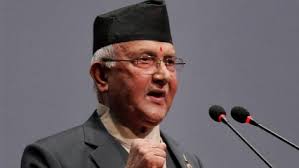 Indrani Bagchi, (TNN, NEW DELHI 20 Dec 20 2017) – The Indian leadership is yet to formally congratulate the KP Oli-Prachanda Left alliance that has swept to power in Nepal, days after the outcome of the elections became clear, raising questions about India’s silence.
Indrani Bagchi, (TNN, NEW DELHI 20 Dec 20 2017) – The Indian leadership is yet to formally congratulate the KP Oli-Prachanda Left alliance that has swept to power in Nepal, days after the outcome of the elections became clear, raising questions about India’s silence.
On being questioned, MEA spokesperson Raveesh Kumar dismissed the notion that India was still somewhat angry with Oli, who campaigned on an overt anti-India stance. “We are waiting for the final results,” he said. According to reports, the final tally gives UML 41 seats under the proportional representation (PR) system and 80 in the first-past-the-post (FPTP) system and Prachanda 17 seats under the PR system and 36 in the FPTP; Nepali Congress came in second with 40 PR seats and 23 FPTP seats. The Maoist-UML alliance, therefore, gets a comfortable majority, but short of two-thirds which would have given them greater powers to change the constitution.
Even the MEA statement welcoming the election outcome was a response to a question by a journalist. “India has age-old unique time-tested ties of friendship with the country. We look forward to working with the next democratically elected government in Nepal to advance our close and multi-faceted partnership across all sectors and to support Nepal in its pursuit of peace, stability, economic prosperity for all-round development,” MEA spokesperson Raveesh Kumar said last week.
Oli’s victory is largely been seen as a victory for pro-China forces in Nepal, which will certainly leave Oli defensive in his dealings with India. As the first government with a clear majority in Nepal, the alliance is expected to deliver stability, though sources say there are still some outstanding issues regarding the coalition which is expected to be sorted out in the coming days, including whether the prime ministership would be shared between Oli and Prachanda. India’s Nepal watchers will wait to see whether Oli makes India his first port of call, as a signal to how he would deal with India. While India regularly gets criticized for “interfering” in Nepal’s internal politics, this time saw several reports pointing to Chinese “interest” in the election outcome.
India would have been happier if the Nepali Congress had returned to power, but there was little popular support for the grand old party among Nepali voters. Despite PM Narendra Modi‘s successful visits to Kathmandu, India-Nepal ties have seen serious dips, first with the blockade which angered the “hill” Nepalis and then among Madhesis who felt India left them in the lurch when New Delhi reached out to KP Oli directly afterwards.

